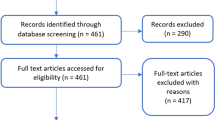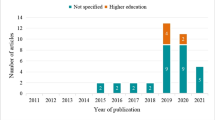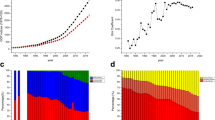Abstract
Education plays a crucial role in personal development and social change. It provides individuals with the necessary skills to succeed in their careers and serve their communities. The Cumulative Grade Point Average (CGPA) is a valuable metric for assessing student’s academic performance. It is calculated by averaging the performance of a student in each semester, also known as Semester Grade Point Average (SGPA). Its prediction can provide several benefits to both faculties and students. It enables faculties to promptly identify weak students who are facing difficulties and provide them with necessary intervention and support. Additionally, SGPA empowers students to establish realistic future goals and make well-informed decisions based on it. In this study, various classification and regression algorithms are applied to predict student’s SGPA and compared using various evaluation metrics. The results concluded that it is feasible to predict SGPA (of students) using machine learning and deep learning models with low error rate and high accuracy as the predicted results will be equally beneficial for both faculties and students.




Similar content being viewed by others

References
Akuma S, Abakpa H (2021) Predicting undergraduate level students’ performance using regression. Niger Ann Pure Appl Sci 4:109–117. https://doi.org/10.46912/napas.224
Akuma S, Abakpa H (2021) Predicting undergraduate level students’ performance using regression. Niger Ann Pure Appl Sci 4:129–139. https://doi.org/10.46912/napas.224
Alangari N, Alturki R (2020) Predicting students final GPA using 15 classification algorithms. Roman J Inf Sci Technol 23:238–249
Alyahyan E, Dusteaor D (2020) Decision trees for very early prediction of student’s achievement. In: 2020 2nd International Conference on Computer and Information Sciences, ICCIS 2020. https://doi.org/10.1109/ICCIS49240.2020.9257646
Baashar Y, Hamed Y, Alkawsi G, Fernando Capretz L, Alhussian H, Alwadain A, Al-amri R (2022) Evaluation of postgraduate academic performance using artificial intelligence models. Alex Eng J 61:9867–9878. https://doi.org/10.1016/j.aej.2022.03.021
Bhaskaran, S.S., 2021. Investigation of Student Performance with Contextual Factors Using Association Rules in Higher Educational Institutions (HEIs). https://doi.org/10.1007/978-981-16-0171-2_41
Bisong E (2019) Introduction to Scikit-learn. Build Mach Learn Deep Learn Models Google Cloud Platform. https://doi.org/10.1007/978-1-4842-4470-8_18
Dey R, Salemt FM (2017) Gate-variants of gated recurrent unit (GRU) neural networks. Midwest Symp Circuits Syst. https://doi.org/10.1109/MWSCAS.2017.8053243
Gajwani J, Chakraborty P (2021) Students’ performance prediction using feature selection and supervised machine learning algorithms. Adv Intell Syst Comput 1165:347–354. https://doi.org/10.1007/978-981-15-5113-0_25/COVER
Gamboa RA, Namasivayam S, Singh R (2018) Correlation study between CGPA and PO attainments: a case study for taylor’s university school of engineering. Redesig Learn Greater Soc Impact. https://doi.org/10.1007/978-981-10-4223-2_1
Ganorkar SS, Tiwari N, Namdeo V (2021) Analysis and prediction of student data using data science: a review. Smart Innov Syst Technol 182:443–448. https://doi.org/10.1007/978-981-15-5224-3_44/COVER
Goel R, Jain A, Verma K, Bhushan M, Kumar A, Negi A (2020) Mushrooming trends and technologies to aid visually impaired people. In: International Conference on Emerging Trends in Information Technology and Engineering, Ic-ETITE 2020. Doi https://doi.org/10.1109/IC-ETITE47903.2020.437
Hans C (2011) Elastic net regression modeling with the orthant normal prior. J Am Stat Assoc 106(496):1383–1393
Hodson TO (2022) Root-mean-square error (RMSE) or mean absolute error (MAE): when to use them or not. Geosci Model Dev 15:5481–5487. https://doi.org/10.5194/GMD-15-5481-2022
Islam Rifat MR, Al Imran A, Badrudduza ASM (2019) EduNet: A Deep Neural Network Approach for Predicting CGPA of Undergraduate Students. 1st International Conference on Advances in Science, Engineering and Robotics Technology 2019, ICASERT 2019. https://doi.org/10.1109/ICASERT.2019.8934616
Jadhav A, Pramod D, Ramanathan K (2019) Comparison of performance of data imputation methods for numeric dataset. Appl Artif Intell. 33:913–933. https://doi.org/10.1080/08839514.2019.1637138
Jain N (2021) Survey versus interviews: comparing data collection tools for exploratory research. The Qualitative Report 26:541–554. https://doi.org/10.46743/2160-3715/2021.4492
Kirkby RB (2007). Improving hoeffding trees (Doctoral dissertation, The University of Waikato).
Lau ET, Sun L, Yang Q (2019) Modelling, prediction and classification of student academic performance using artificial neural networks. SN Appl Sci 1:1–10. https://doi.org/10.1007/S42452-019-0884-7/FIGURES/6
LaValley MP (2008) Logistic Regression. Circulation 117:2395–2399. https://doi.org/10.1161/CIRCULATIONAHA.106.682658
Liu Y, Wang Y, Zhang J, (2012) New machine learning algorithm: Random forest. Lecture Notes in Computer Science (including subseries Lecture Notes in Artificial Intelligence and Lecture Notes in Bioinformatics) 7473 LNCS, 246–252. https://doi.org/10.1007/978-3-642-34062-8_32/COVER
McDonald GC (2009) Ridge regression. Wiley Interdiscip Rev Comput Stat 1:93–100. https://doi.org/10.1002/WICS.14
Myles AJ, Feudale RN, Liu Y, Woody NA, Brown SD (2004) An introduction to decision tree modeling. J Chemom 18:275–285. https://doi.org/10.1002/CEM.873
O’Shea K, Nash R (2015) An Introduction to Convolutional Neural Networks. Int J Res Appl Sci Eng Technol 10:943–947. https://doi.org/10.22214/ijraset.2022.47789
Rai S, Shastry KA, Pratap S, Kishore S, Mishra P, Sanjay HA (2021) Machine learning approach for student academic performance prediction. Adv Intell Syst Comput 1176:611–618. https://doi.org/10.1007/978-981-15-5788-0_58/COVER
Rai P, Kothari EE, Bhushan M, Negi A (2023) Vehicle theft identification using machine learning and OCR. Springer, Singapore, pp 753–763. https://doi.org/10.1007/978-981-99-0085-5_61
Ranstam J, Cook JA (2018) LASSO regression. Br J Surg 105:1348–1348. https://doi.org/10.1002/BJS.10895
Roshan V, Stewart JHM, Joseph R, Stewart HM (2022) Optimal ratio for data splitting. ASA Data Sci J 15:531–538. https://doi.org/10.1002/SAM.11583
Saifuzzaman M, Parvin M, Jahan I, Moon NN, Narin Nur F, Shetu SF (2021) Machine Learning Approach to Predict SGPA and CGPA. In: ICAICST 2021–2021 International Conference on Artificial Intelligence and Computer Science Technology 211–216. https://doi.org/10.1109/ICAICST53116.2021.9497847
Samsudin NAM, Shaharudin SM, Sulaiman NAF, Smail SI, Mohamed NS, Husin NHM (2022) Prediction of student’s academic performance during online learning based on regression in support vector machine. Int J Inf Edu Technol. 12:1431–1435
Pathan S, Bhushan M, Bai A (2020) A study on health care using data mining techniques. J Crit Rev 7(19):7877–7890. https://doi.org/10.31838/jcr.07.19.896
Pawar S, Bhushan M, Wagh M (2020) The plant leaf disease diagnosis and spectral data analysis using machine learning–a review. Int J Adv Sci Technol 29(9s):3343–3359
Sharma D, Aggarwal D (2021) A predictive approach to academic performance analysis of students based on parental influence. Adv Intell Syst Comput 1165:75–84. https://doi.org/10.1007/978-981-15-5113-0_6/COVER
Shetu SF, Saifuzzaman M, Moon NN, Sultana S, Yousuf R (2021) Student’s performance prediction using data mining technique depending on overall academic status and environmental attributes. Adv Intell Syst Comput 1166:757–769. https://doi.org/10.1007/978-981-15-5148-2_66/COVER
Staudemeyer, R.C., Morris, E.R., 2019. Understanding LSTM––a tutorial into Long Short-Term Memory Recurrent Neural Networks.
Su X, Yan X, Tsai CL (2012) Linear regression. Wiley Interdiscip Rev Comput Stat 4:275–294. https://doi.org/10.1002/WICS.1198
Suryadewiansyah MK, Tju TEE (2022) Naïve bayes dan confusion matrix untuk efisiensi analisa intrusion detection system alert. Jurnal Nasional Teknologi Dan Sistem Informasi 8(2):81–88
Verma U, Garg C, Bhushan M, Samant P, Kumar A, Negi A (2022) Prediction of student’s academic performance using machine learning techniques. 2022 Int Mob Embed Technol Conf MECON 2022:151–156. https://doi.org/10.1109/MECON53876.2022.9751956
Webb GI (2016) Naïve Bayes. Encyclopedia of Machine Learning and Data Mining. Springer, USA, pp 1–2
Yakubu MN, Abubakar AM (2022) Applying machine learning approach to predict students’ performance in higher educational institutions. Kybernetes 51:916–934. https://doi.org/10.1108/K-12-2020-0865
Yulianto LD, Triayudi A, Sholihati ID (2020) Implementation educational data mining for analysis of student performance prediction with comparison of K-nearest neighbor data mining method and decision tree C4.5. Jurnal Mantik 4(1):441–451
Acknowledgements
The authors would like to thank School of Computing, DIT University for helping them to collect the dataset.
Funding
The authors have no relevant financial or non-financial interests to disclose.
Author information
Authors and Affiliations
Corresponding author
Ethics declarations
Conflict of Interest
The authors declare that they have no conflicts of interest.
Additional information
Publisher's Note
Springer Nature remains neutral with regard to jurisdictional claims in published maps and institutional affiliations.
Rights and permissions
Springer Nature or its licensor (e.g. a society or other partner) holds exclusive rights to this article under a publishing agreement with the author(s) or other rightsholder(s); author self-archiving of the accepted manuscript version of this article is solely governed by the terms of such publishing agreement and applicable law.
About this article
Cite this article
Bhushan, M., Vyas, S., Mall, S. et al. A comparative study of machine learning and deep learning algorithms for predicting student’s academic performance. Int J Syst Assur Eng Manag 14, 2674–2683 (2023). https://doi.org/10.1007/s13198-023-02160-3
Received:
Revised:
Accepted:
Published:
Issue Date:
DOI: https://doi.org/10.1007/s13198-023-02160-3



